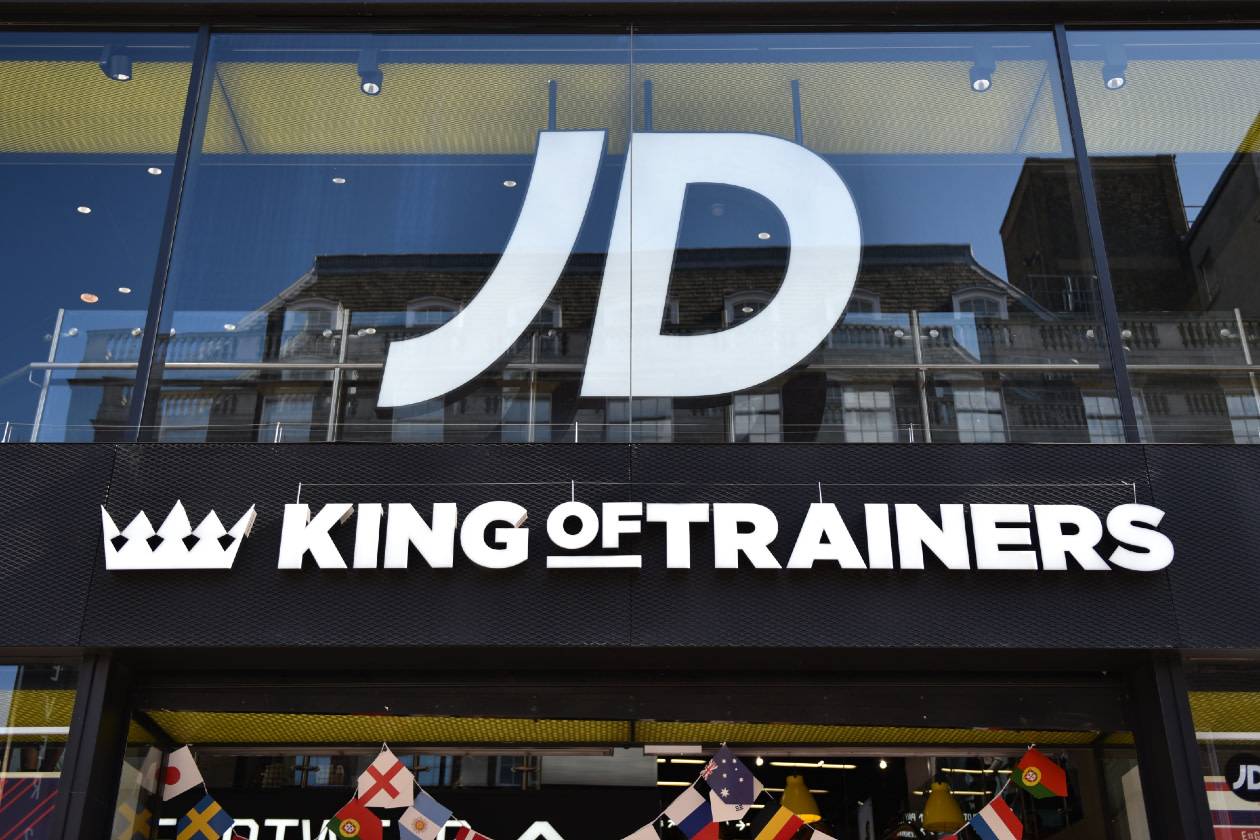JD Sports reported first-half organic revenue growth of 6.4% to £5.0bn. Europe, North America and Asia Pacific all posted double-digit growth, while the UK posted a decline reflecting a challenging and volatile market.
Underlying pre-tax profits were up 3.4% to £405.6mn, ignoring currency impacts. Despite an increase in operating margin, profit growth was held back by rising finance charges.
Free cash flow fell from £99.0mn to £88.4mn. Net debt, including leases, rose from £1.1bn to £2.8bn largely as a result of the Hibbett acquisition.
Full-year guidance has been reiterated, expecting underlying pre-tax profits of between £955-£1,035mn. But this now includes a £25mn contribution from Hibbett, which was previously excluded, implying a small downgrade to the full-year outlook.
An interim dividend of 0.33p per share was announced, up 10%.
The shares fell 3.8% following the announcement.
Our view
After a shaky start to the year, things picked up and JD Sports recorded a solid first-half performance. But the outlook for the second half seems a little soft, with full-year profit guidance getting a small downgrade.
Some level of volatility is to be expected. Recent retail sector data has pointed to increased discounting at shops to help keep the tills ringing. JD’s done a good job of offsetting this with tight cost control, but where demand trends from here will be key.
Looking past this softness, there’s a lot to like structurally about the market that JD operates in. The global sports apparel market is huge – valued at $396bn in 2023 and expected to grow to $544bn by 2028.
To service all this demand, JD’s continuing to expand its footprint through acquisitions and new store openings. The US-based Hibbett acquisition is substantial, and continues the group’s impressive growth in the region. There’s likely to be some work to do in terms of streamlining operations, but the deal further strengthens its foothold in the world’s largest sportswear market.
Filling the racks in these stores are exclusive items from the likes of Nike and Adidas. JD is known for its strong brand relationships and is even Nike’s single largest partner globally. Being able to offer these ‘JD Exclusives’ helps to lure customers into stores and boost market share.
The group’s sales mix by region is also better balanced than some of its biggest competitors, which helps smooth out bumps in the road if one market slows. With UK sales having a disappointing start to the year, this diversity is helping to keep growth targets alive. And because the group sits at the premium end of the market, it typically has healthier margins than its peers too.
But JD Sports faces challenges. CEO Régis Schultz hasn’t shied away from ambitious expansion plans in North America and Europe, but growth isn’t coming cheap. Its strong balance sheet means there isn’t currently cause for concern, but £0.5bn of additional capital spend for store expansion and the latest billion-dollar Hibbett deal does increase the pressure to deliver.
JD Sports' strategy execution is impressive and the growth opportunities are evident. But, with consumer sentiment and demand still uncertain, the company is taking a risk by expanding capacity ahead of market recovery.
The company’s valued at just 10.4 times forward earnings, significantly below its long-run average. This reflects recent disappointments and uncertainty surrounding the retail sector in the near term, so more ups and downs could lie ahead. But in the long term, we think the current valuation overlooks the company’s strong revenue and profit growth prospects.
Environmental, social and governance (ESG) risk
The retail industry is low/medium in terms of ESG risk but varies by subsector. Online retailers are the most exposed, as are companies based in the Asia-Pacific region. The growing demand for transparency and accountability means human rights and environmental risks within supply chains have become a key risk driver. The quality and safety of products as well as their impact on society and the environment are also important considerations.
According to Sustainalytics, JD Sports’ management of ESG risk is strong.
The group’s environmental policy is strong and executive remuneration is explicitly linked to sustainability performance targets. There is also an adequate whistleblower policy in place. However, ESG reporting and disclosures fall short of best practice.
JD Sports key facts
All ratios are sourced from Refinitiv, based on previous day’s closing values. Please remember yields are variable and not a reliable indicator of future income. Keep in mind key figures shouldn’t be looked at on their own – it’s important to understand the big picture.
This article is not advice or a recommendation to buy, sell or hold any investment.No view is given on the present or future value or price of any investment, and investors should form their own view on any proposed investment.This article has not been prepared in accordance with legal requirements designed to promote the independence of investment research and is considered a marketing communication.Non - independent research is not subject to FCA rules prohibiting dealing ahead of research, however HL has put controls in place(including dealing restrictions, physical and information barriers) to manage potential conflicts of interest presented by such dealing.Please see our full non - independent research disclosure for more information.


